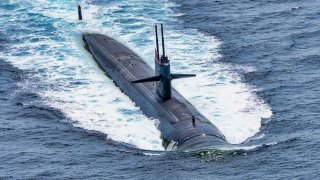Submarines Could Be the Chinese Navy's Achilles Heel
China has failed to develop a submarine fleet capable of competing with the United States Navy. That could create huge problems in a future war, as many analysts think could happen if tensions keep rising.
Last year, the U.S. Naval Institute published an essay by Mike Sweeney claiming that “Submarines Will Reign in a War with China.” The essay, as you might expect, suggested that the submarine—rather than the aircraft carrier—will be the most important naval vessel of the future.
Were submarines to reign supreme in the future of naval warfare, the United States would benefit, as China has failed to develop a submarine fleet capable of competing with the Americans.
The era of the submarine?
Sweeney’s essay echoed the sentiments of noted historian John Keegan, who argued in the 1980s that of the two most important naval platforms to emerge during World War II (the aircraft carrier and the submarine) it was the submarine that would prove more vital to future warfare.
“The aircraft carrier, whatever realistic scenario or action is drawn...will be exposed to a wider range of threats than the submarine must face,” Keegan wrote. “In a shoreward context, it risks attack not only by carrier-borne but also by land-based aircraft, land-based missiles, and the submarine itself.”
Keegan’s insights drew heavily upon the only significant naval engagement fought since the conclusion of World War II, the Falkland Islands War. During the conflict, the British navy was confronted with a new threat (anti-ship cruise missiles, or ASCMs) and an old threat, the submarine. The Argentinians, defending the Falkland Islands, deployed the San Luis diesel-powered submarine. Despite being poorly maintained, despite being staffed with a poorly trained crew, the San Luis proved troublesome for the relatively advanced British navy. The British navy deployed a submarine, too, the nuclear-powered HMS Conqueror, which sank Argentina’s General Belgrano cruiser, scaring the Argentine Navy to port for the rest of the conflict. Keegan believed that the threat submarines (and ASCMs) posed would prove insurmountable and un-survivable, causing the oceans to become “empty,” with future combatants engaging only beneath the surface of the waves.
Now, Keegan’s prediction hangs over the heads of U.S. war planners prepping for conflict with China.
“Increased threats to aircraft carriers and other surface combatants from “land-based aircraft, land-based missiles, and the submarine itself” is a fair description of the anti-access/area denial (A2/AD) capabilities China has developed,” Sweeney wrote. “More broadly, the future of undersea warfare is likely to be a major determinant of the long-term military balance between China and the United States.”
Preparing for China
China is currently amid one of world history’s most ambitious shipbuilding sprees, a modernization “remarkable in its scope and success,” according to Sweeney. Yet, despite the scope and success, China’s navy has failed to produce high-quality nuclear submarines. Whereas the United States (and Soviets) were able to achieve sophisticated quieting technology decades ago, the Chinese SSN, the Shang-class, “is estimated to be on par with Soviet designs from the 1970s, before the quieting breakthroughs that produced the Akula.” And “China’s SSBNs, the Jin-class, have noise levels comparable to Soviet SSBNs that first put to sea more than four decades ago,” Sweeney wrote.

Accordingly, without capable nuclear-powered submarines, Sweeney argues, the Chinese navy will “remain a regional navy.” True, China has built the capabilities to challenge U.S. supremacy in the narrowly defined “western Pacific,” but that “does not equate to a global challenge to U.S. naval superiority.” In order to compete with the United States on a global level, “China would have to expand its expeditionary operations and a central part of that would need to be vastly improved undersea warfare capabilities.”
About the Author: Harrison Kass
Harrison Kass is a defense and national security writer with over 1,000 total pieces on issues involving global affairs. An attorney, pilot, guitarist, and minor pro hockey player, Harrison joined the US Air Force as a Pilot Trainee but was medically discharged. Harrison holds a BA from Lake Forest College, a JD from the University of Oregon, and an MA from New York University. Harrison listens to Dokken.


